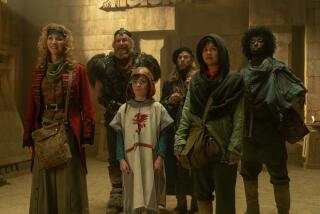Monty Python’s ‘Holy Grail’ Remains an Inspired Romp
To see “Monty Python and the Holy Grail” 26 years after its original release is to appreciate it considerably more than the first time around--especially when an initial look proved to be a turnoff.
The inspired lunacy of the famed British comedy troupe’s take on King Arthur and his knights’ quest for the Holy Grail is more often amusing than hilarious in effect; if there are laugh-out-loud moments, there are also passages that are dry and overly talky. On the whole, however, it’s understandable why the film and the Monty Pythons have such a cult following, although their “Life of Brian” still seems in retrospect funnier and less arcane.
Two aspects of the film stand out: first, its glorious Scottish locales--never mind that all those castles presumably would have been in less ruinous condition back in the Middle Ages; second, the erudition of the Pythons, several of whom were actually steeped in medieval history and literature.
In short, they create a persuasively authentic world with considerable care--the better to send it up. They cherish nonsense for its own sake, but they also skewer stupidity, ignorance, an unquestioning acceptance of conventional pieties and received wisdom.
They were no more prepared to take on face value the myths of chivalry and nobility of purpose surrounding Arthurian legend than they were, with “Life of Brian,” the Sunday-school version of the life of Christ.
Since the Pythons started production in April 1974, and their picture opened in New York and London in April 1975, just as Saigon fell, it can also be read as an expose of the folly and brutality of war.
All six of the Monty Pythons wrote and performed in “The Holy Grail,” each assuming numerous roles.
Opening Friday at the Nuart with a fresh print and a new stereo soundtrack, “The Holy Grail” was directed by Terry Gilliam and Terry Jones in jaunty knockabout fashion that flags a bit just before a socko finish.
It begins with King Arthur (the late Graham Chapman) and his page Patsy (Gilliam) setting off on their invisible horses in search of “the bravest and fiercest knights of the land” to join the king back at Camelot.
Early on, one of Arthur’s acolytes slices off the legs and arms of the Black Knight (John Cleese) when he refuses to join the Round Table, responding to each dismemberment as “just a scratch.” Somehow it’s easier now to see this moment--the most memorable of the entire film, for better or worse--as part of the Pythons’ absurdist vision, but the nonchalant savagery of the sequence was so shocking when first seen that it had the potential to destroy any pleasure in watching “The Holy Grail.”
In time, Arthur gathers around him Bedevere the Wise (Terry Jones)--the daffiest of logicians--Sir Lancelot the Brave (Cleese), Sir Galahad the Pure (Michael Palin) and Sir Robin the Not-Quite-So-Brave (Eric Idle). They embark upon such adventures as luring some disrespecting French knights out of their castle with the gift of a giant wooden rabbit but forget to hide three knights inside it, Trojan Horse-style.
About now they receive word from God Himself that they are to search for the Holy Grail and, faced with one foul-up after another, they decide that each knight should go off to seek the Grail on his own, which makes for a series of episodic adventures, one of which finds Sir Galahad confronted with a castle full of young, sex-starved beauties but saved in the nick of time “from almost certain temptation.”
About halfway through the film, the Pythons switch to the present to introduce an elderly historian (John Young), whose spritely commentary on the exploits of Arthur and his knights is interrupted in a startling manner that will pay off handsomely at the film’s bravura finale.
For all its shenanigans, “Monty Python and the Holy Grail” has a sense of humor that is intellectual, even academic, at heart.
The film, which is being re-released by Henry Jaglom’s Rainbow Pictures, wasn’t for everybody when it was made and probably never will be. But it’s safe to say it will always have ardent admirers.
* MPAA rating: PG. Times guidelines: some scenes of comic brutality, including dismemberment and battle scenes, that are too graphic for young children.
‘Monty Python and the Holy Grail’
Graham Chapman: King Arthur, etc.
John Cleese: Sir Lancelot, etc.
Terry Gilliam: Patsy, etc.
Eric Idle: Sir Robin, etc.
Terry Jones: Sir Bedevere, etc.
Michael Palin: Sir Galahad, etc.
A Rainbow Pictures release of a Python (Monty) Pictures Ltd. presentation in association with Michael White. Directors Terry Gilliam & Terry Jones. Producer Mark Forstater. Executive producer John Goldstone. Screenplay by Graham Chapman, John Cleese, Terry Gilliam, Eric Idle, Terry Jones, Michael Palin. Cinematographer Terry Bedford. Editor John Hackney. Music Songs by Neil Innes. Additional music De Wolfe. Costumes Hazel Pethig. Fight director and period consultant John Waller. Production designer Roy Smith. Running time: 1 hour, 30 minutes.
Exclusively at the Nuart through Thursday, 11272 Santa Monica Blvd., West Los Angeles, (310) 478-8379.
More to Read
Only good movies
Get the Indie Focus newsletter, Mark Olsen's weekly guide to the world of cinema.
You may occasionally receive promotional content from the Los Angeles Times.










